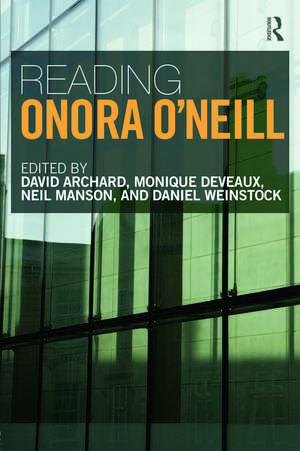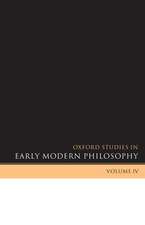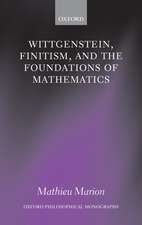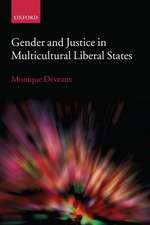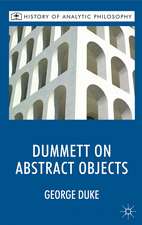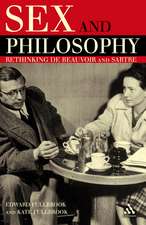Reading Onora O'Neill
Editat de David Archard, Monique Deveaux, Neil Manson, Daniel Weinstocken Limba Engleză Paperback – 25 iun 2013
Reading Onora O’Neill is the first book to examine and critically appraise the work of this important thinker. It includes specially commissioned chapters by leading international philosophers in ethics, Kantian philosophy and political philosophy. The following aspects of O’Neill’s work are examined:
- global justice
- Kant
- the ethics of the family
- bioethics
- consent
- trust.
| Toate formatele și edițiile | Preț | Express |
|---|---|---|
| Paperback (1) | 434.25 lei 6-8 săpt. | |
| Taylor & Francis – 25 iun 2013 | 434.25 lei 6-8 săpt. | |
| Hardback (1) | 1002.63 lei 6-8 săpt. | |
| Taylor & Francis – 28 iun 2013 | 1002.63 lei 6-8 săpt. |
Preț: 434.25 lei
Nou
Puncte Express: 651
Preț estimativ în valută:
83.09€ • 90.54$ • 70.02£
83.09€ • 90.54$ • 70.02£
Carte tipărită la comandă
Livrare economică 23 aprilie-07 mai
Preluare comenzi: 021 569.72.76
Specificații
ISBN-13: 9780415675987
ISBN-10: 0415675987
Pagini: 264
Dimensiuni: 156 x 234 x 18 mm
Greutate: 0.41 kg
Ediția:New.
Editura: Taylor & Francis
Colecția Routledge
Locul publicării:Oxford, United Kingdom
ISBN-10: 0415675987
Pagini: 264
Dimensiuni: 156 x 234 x 18 mm
Greutate: 0.41 kg
Ediția:New.
Editura: Taylor & Francis
Colecția Routledge
Locul publicării:Oxford, United Kingdom
Public țintă
Postgraduate and UndergraduateCuprins
Introduction David Archard, Monique Deveaux, Neil Manson, and Daniel Weinstock Part 1: Kant on Action and Reason 1. Moral Worth and Moral Rightness, Maxims and Actions Marcia Baron 2. Constructivist Practical Reasoning and Objectivity Melissa Barry 3. Varieties of Constructivism Thomas Hill Jr. 4. Hope as Prudence: Practical Faith in Kant’s Political Thinking Katrin Flikschuh Part 2: Agency , Consent and Autonomy 5. Informed Consent and Referential Opacity Neil Manson 6. Respect for Autonomy in Medical Ethics Suzanne Uniacke 7. Independence, Dependence, and the Liberal Subject Marilyn Friedman Part 3: Some Practical Questions 8. Agents of Global Justice Simon Caney 9. Procreative Rights and Procreative Duties David Archard Part 4:Trustworthiness and Trust 10. What is Trust? Annette Baier 11. Distrusting the Trustworthy Karen Jones 12. Trust in Institutions Daniel Weinstock Responses Onora O’Neill. Index
Recenzii
"... this volume provides a wide-ranging and high quality overview of O'Neill's contributions to moral philosophy. The essays are also of considerable philosophical interest in their own right. I commend the volume to anyone with interest in O'Neill's work, or in broader issues of Kantianism, constructivism, autonomy, consent, and trust." - Anna Stilz, Notre Dame Philosophical Reviews
"Lucid and timely, these essays honour the arguments of this exceptional moral philosopher, not by meekly accepting them, but by challenging them, and taking them in new directions. The breadth of their topics reflects the range of O'Neill's reflective engagement: what autonomy, consent and independence mean for fallible agents, and why these matter; whether moral norms are in some sense constructed; whether we have a right to have children; what hope means for Kant's account of ethics and religion. Especially timely are responses to O'Neill's work on trust and communication, looking at testimony in contexts rife with prejudice. In their own way, these essays offer answers to Kant's famous trio of questions: What can I know? What must I do? What may I hope? The answers they propose are sometimes more realistic than Kant's own, since, following O'Neill's lead, they do better justice to our vulnerabilities and limitations, as knowers and agents living in social circumstances that are far from ideal-and in so doing, they offer eloquent proof of O'Neill's continuing power to inspire and engage." - Rae Langton, Massachusetts Institute of Technology, USA
"Lucid and timely, these essays honour the arguments of this exceptional moral philosopher, not by meekly accepting them, but by challenging them, and taking them in new directions. The breadth of their topics reflects the range of O'Neill's reflective engagement: what autonomy, consent and independence mean for fallible agents, and why these matter; whether moral norms are in some sense constructed; whether we have a right to have children; what hope means for Kant's account of ethics and religion. Especially timely are responses to O'Neill's work on trust and communication, looking at testimony in contexts rife with prejudice. In their own way, these essays offer answers to Kant's famous trio of questions: What can I know? What must I do? What may I hope? The answers they propose are sometimes more realistic than Kant's own, since, following O'Neill's lead, they do better justice to our vulnerabilities and limitations, as knowers and agents living in social circumstances that are far from ideal-and in so doing, they offer eloquent proof of O'Neill's continuing power to inspire and engage." - Rae Langton, Massachusetts Institute of Technology, USA
Descriere
Reading Onora O’Neill is the first book to examine and critically appraise the work of this important thinker. It includes specially commissioned chapters by leading philosophers and features replies from Onora O’Neill. Essential reading for students and scholars of ethics and political philosophy.
